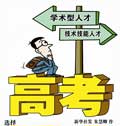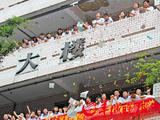江苏省扬州中学2014届高三英语试卷
2014.4.13
第I卷
第一部分:听力(共两节,满分20分)
第一节(共5小题;每小题1分,满分5分)
听下面5段对话。每段对话后有一个小题,从题中所给的A、B、C三个选项中选出最佳选项,并标在试卷的相应位置。听完每段对话后,你都有10秒钟的时间来回答有关小题和阅读下一小题。每段对话仅读一遍。
1. What does the man want?
A. A tennis game. B. An online game. C. A shooting game.
2. What will the man do next?
A. Make dinner. B. Wash the dishes. C. Watch TV.
3. What does the man mean?
A. He prefers to keep the window closed.
B. He is too busy to open the window.
C. He agrees to open the window at once.
4. What is the time now?
A. About 5:30. B. About 5:00. C. About 4:30.
5. What does the man suggest doing?
A. Pressing the emergency button.
B. Calling the service centre.
C. Doing nothing for a short while.
第二节(共15小题;每小题1分,满分15分)
听下面5段对话。每段对话后有几个小题,从题中所给的A、B、C三个选项中选出最佳选项,并标在试卷的相应位置。听每段对话前,你将有时间阅读各个小题,每小题5秒钟;听完后,各小题给出5秒钟的作答时间。每段对话读两遍。
听第6段材料,回答第6、7题。
6. What did the woman spend $10 on?
A. The taxi. B. The hot dogs. C. The popcorn and drinks.
7. Where did the speakers go just before they went home?
A. To the convenience store. B. To the movies.
C. To the new hot dog place.
听第7段材料,回答第8至10题。
8. What relation is Ms Leska to the woman?
A. Her roommate. B. Her cousin. C. Her workmate.
9. Who will probably meet Kevin at the bus station?
A. Claudia. B. Tara. C. Albee.
10. What will the woman do at 3:00 p.m.?
A. Meet the man. B. Look after Ms Leska. C. Teach a class.
听第8段材料,回答第11至13题。
11. How did the man learn to play instruments?
A. He taught himself.
B. He learned it at school.
C. He learned it at pubs and clubs.
12. What instrument did the man play first?
A. The piano. B. Keyboards. C. The drum.
13. When did the man leave school?
A. In 1981. B. In 1992. C. In 1997.
听第9段材料,回答第14至17题。
14. What are the speakers mainly talking about?
A. An article. B. A newspaper. C. A minibus.
15. How did the girl fall down on the road?
A. She tripped over something.
B. She was knocked over by a car.
C. She slipped because of the wet road.
16. Who flew out in the accident?
A. A car driver. B. A minibus driver. C. A minibus passenger.
17. What can we learn from the conversation?
A. The accident took place on Tuesday.
B. A truck was involved in the accident.
C. The woman witnessed the accident.
听第10段材料,回答第18至20题。
18. When were the speaker and his friends caught in a storm?
A. The second night. B. The fifth night. C. The last night.
19. What was the weather like on the last day?
A. Rainy. B. Cloudy. C. Fine.
20. What do we know about the speaker?
A. He was persuaded into the trip.
B. He walked 100 miles in one week.
C. He was disappointed at the trip.
第二部分:知识运用(共两节,45分)
第一节 单项填空(共15小题;每小题1分,共15分)
从每题所给的A、B、C、D四个选项中,选出可以填入空白处的最佳选项,并在答题卡上将该项涂黑。
21. On account of fuel supplies being finite and many people being wasteful, we will have to install ________ solar heating device in our home.
A. some type of a B. some types of a C. some type of D. some types of
22. The priest made the ________ of the cross when he entered the church.
A. mark B. signal C. sign D. gesture
23. The couple ________their old house and sold it for a vast profit.
A. did for B. did in C. did with D. did up
24. I went there in 1984, and that was the merely occasion when I ________ the journey in exactly two days.
A. must take B. must have made C. was able to make D. could take
25. There are still many problems ahead of us, but by this time next year we can see light at the end of the ________.
A. battle B. day C. road D. tunnel
26. I know he failed his last test, but really he’s ________ stupid.
A. something but B. anything but C. nothing but D. not but
27. ________, Mr. Wells is scarcely in sympathy with the working class.
A. Although he is a socialist B. Even if he is a socialist
C. Being a socialist D. Since he is a socialist
28. Traditionally, local midwives would ________ all the babies in the area.
A. handle B. produce C. deliver D. help
29. What’s the chance of ________ a general election this year?
A. there being B. there to be C. there be D. there going to be
30. Thousands of people turned out into the streets to ________ against the local authorities’ decision to build a highway across the field.
A. contradict B. reform C. counter D. protest
31. Mr. Brown’s condition looks very serious and it is doubtful if he will ________.
A. pull back B. pull up C. pull through D. pull out
32. His remarks were ________ enrage everybody at the meeting.
A. so as to B. such as to C. such to D. as much as to
33. — Joe, don’t forget to bring your laptop with you tomorrow, OK?
— Oh, thank you. I wouldn’t bring it if you _____ me.
A. wouldn’t remind B. haven’t reminded
C. hadn’t reminded D. shouldn’t have reminded
34. _____ more effectively with others, more and more people equip themselves with a higher education.
A. Compete B. Being competed C. To compete D. Competing
35. Health experts believe that even a little exercise is far better than _____at all.
A. none B. little C. everything D. anything
第二节 完形填空(共20小题;每小题1.5分,共30分)
阅读下面短文,掌握其大意,从每题所给的A、B、C、D四个选项中,选出最佳选项,并在答题卡上将该项涂黑。
Thanks to a combination of young businessmen, large numbers of university students and revitalization (新生) efforts by the local and national governments, today’s Nanjing has an 36 of youthful exuberance (繁茂) that would have been 37 only a few decades ago. 38 , the city, a booming city of 6.5 million on the banks of the Yangtze River some 185 miles west of Shanghai, bears 39 resemblance to the former capital of China that suffered the worst cruelty and violence of World War II.
40 Nanjing has shown a remarkable capacity for reinvention during its 2,500-year history. And in recent years, the city has moved 41 its tragic past to become a vital engine of China’s economic growth, thanks 42 to its position in the middle of China’s prosperous eastern seaboard. Growth has also 43 thanks to improved ground transportation: A new bullet train linking Nanjing and Shanghai started service last year, 44 travel time between the cities from several hours to just 75 minutes, and a Beijing-Shanghai high-speed line is 45 to open later this year, with a stop in Nanjing. Within the city, two metro lines were built in the last few years; 15 more are planned to begin service by 2030.
Signs of Nanjing’s 46 wealth and optimism can be seen everywhere. In the heart of the downtown Xinjiekou district, a bronze statue of Sun Yat-sen, 47 the father of modern China, looks 48 over a busy 49 area.
There is perhaps no more 50 symbol of the city’s transformation than the Zifeng Tower, a 1,480-foot skyscraper that opened its doors last May. 51 offices, restaurants and an InterContinental hotel, the tower is the second-tallest building in China and billed as the seventh-tallest in the world.
Underlying all this development is a large Chinese and 52 student population — there are several major universities, plus a branch of Johns Hopkins’s international studies school. In fact, art and music 53 in all sorts of places.
On a larger 54 , local government officials and private investors are pushing the city as a rising center for contemporary art and architecture, hoping to attract 55 from the neon-bathed streets of its neighbor Shanghai.
36. A. advance B. affection C. air D. ability
37. A. unforgettable B. unthinkable C. unbearable D. unnecessary
38. A. Actually B. Regretfully C. Hopefully D. Consequently
39. A. close B. slight C. much D. little
40. A. Because B. But C. As D. Since
41. A. beyond B. on C. off D. out
42. A. in addition B. in all C. in part D. in fact
43. A. started B. enlarged C. existed D. accelerated
44. A. removing B. cutting C. dividing D. lowering
45. A. scheduled B. invented C. desired D. meant
46. A. attractive B. well-received C. newfound D. discovered
47. A. thought B. treated C. considered D. elected
48. A. out B. at C. about D. for
49. A. remote B. regional C. rural D. commercial
50. A. universal B. visible C. traditional D. political
51. A. Keeping B. Consisting C. Opening D. Housing
52. A. British B. western C. American D. foreign
53. A. spring up B. stand up C. set up D. keep up
54. A. extent B. degree C. scale D. level
55. A. businessmen B. students C. tourists D. painters
上一篇:福建省龙岩市2014届高三文科数学毕业班3月教学质量检查试卷及答案
下一篇:四川省眉山市2014届高三文科综合第二次诊断性考试试卷及答案

 你现在的位置:
你现在的位置: 江苏省试卷
江苏省试卷 图片新闻
图片新闻




 热门试卷
热门试卷




